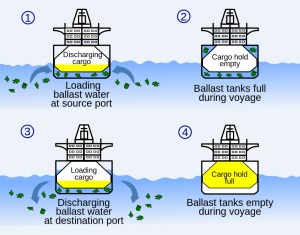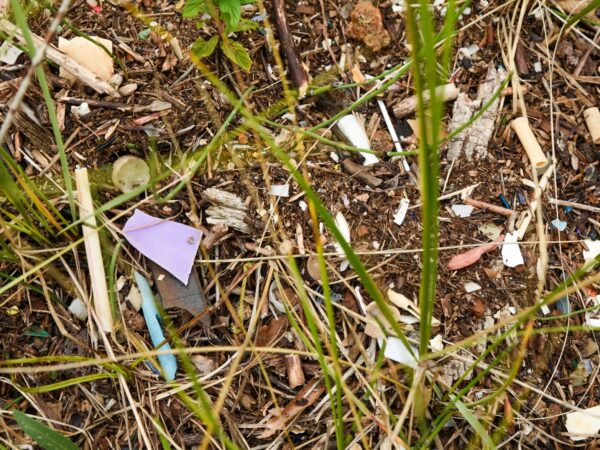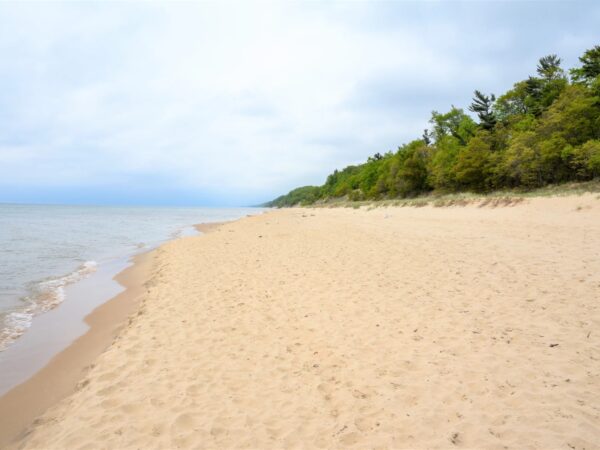
Compromise legislation praised by Great Lakes shipping industry, conservation groups
In a bipartisan move, the U.S. Senate last week passed legislation that authorizes funding for the U.S. Coast Guard and, following years of debate, changes ballast water regulation by setting a national standard for discharges.

Water pollution by ballast water, Image by MaxxL via wikimedia cc 3.0
The national discharge standard has been long-sought by the shipping industry in the Great Lakes region where individual states have been allowed to set their own standards.
The Great Lakes have been plagued for decades by aquatic invasive species that hitched a ride into the lakes in ballast water tanks in ships. The invaders – which include zebra mussels, lampreys and the round goby – have upset the balanced ecology of the lakes, and the U.S. Fish and Wildlife Service estimates that it costs the region $200 million annually to control aquatic invasive species that come from ballast water discharges.
The legislation, S. 140, assigns to the Environmental Protection Agency the “primary responsibility for establishing standards relating to the discharge of pollutants from vessels.”
Click HERE to see the full text of the bill.
The legislation also provides funding for the Commission to be a “neutral convener” on ballast water discharge issues in the region.
“Regulatory chaos”
The bill will prohibit the states from establishing their own discharge standards. That will relieve the shipping industry from having to comply with regulations administered by two federal agencies and seven of the Great Lakes states, according to James Weakley, president of the Lake Carriers Association.

James Weakley, President of the Lake Carriers Association, Photo by c-span.org
Weakley told Great Lakes Now that the previous “balkanized regulations” were “inappropriate for interstate and international commerce,” and the American Great Lakes Ports Association called them “regulatory chaos.”
Weakley cautioned that the bill as passed allows the EPA and Coast Guard a combined 4 years to develop and implement new regulations, thus continuing the “regulatory chaos” until that process is complete.
Cargo moved on the Great Lakes-St. Lawrence River and Seaway supports 329,000 jobs and generates $46 billion annually in economic activity according to a recent Martin & Associates study.
The bill contains a provision that allows Great Lakes governors to petition the EPA for stricter standards including requiring shippers to follow best management practices.
Maintaining core protections
A coalition of conservation organizations said the bill maintains “core clean water protections.”
In its praise for the bill, the group chastised the shipping industry and its congressional supporters for their previous ballast water legislation proposal which was defeated.
“For years, the shipping industry and some members of Congress have worked to obliterate clean water protections to prevent so-called ballast water invaders that have wreaked havoc on the environment and economy,” the coalition said in a press release reacting to the legislation.
The group said “earlier versions of the bill would have essentially eliminated current clean water protections” but the version passed last week maintains many of those protections.
The coalition, led by the National Wildlife Federation’s Great Lakes office, noted that the bill makes it “more difficult for states to enact protections that go beyond federal measures.”
Craig Middlebrook, deputy administrator of the St. Lawrence Seaway Development Corporation, previously told Great Lakes Now that “there is no question that for the last ten years that the commitment by the shipping industry to fight aquatic invasive species has been strong.”
The Seaway Corporation is part of the U.S. Department of Transportation.
Stabenow, Portman lead
The Lake Carriers’ Weakley credited U.S. Sen. Debbie Stabenow, D-Mich., and U.S. Sen. Rob Portman, R-Ohio, with securing the bill’s Great Lakes provisions.

Michigan Senator Debbie Stabenow and Ohio Senator Rob Portman, Photos by United States Senate via Wikimedia
“As co-chairs of the Great Lakes Task Force, Senators Stabenow and Portman worked through many of the contentious regional issues with stakeholders, committee staffs and other Senators,” Weakley said.
“This bill will both protect the Great Lakes against the spread of invasive species and ensure that our shipping industry in Ohio and across the Great Lakes is competitive,” Portman said in a statement.
Stabenow praised the legislation’s bipartisan compromise and said “this is yet another example of what we can accomplish when we work across the aisle to protect our Great Lakes.”
The bill also contains language to advance the purchase of a second heavy icebreaker for the region and establishes a Coast Guard center to prepare for oil spills in the Great Lakes.
The legislation now goes to the House where it is expected to pass.




